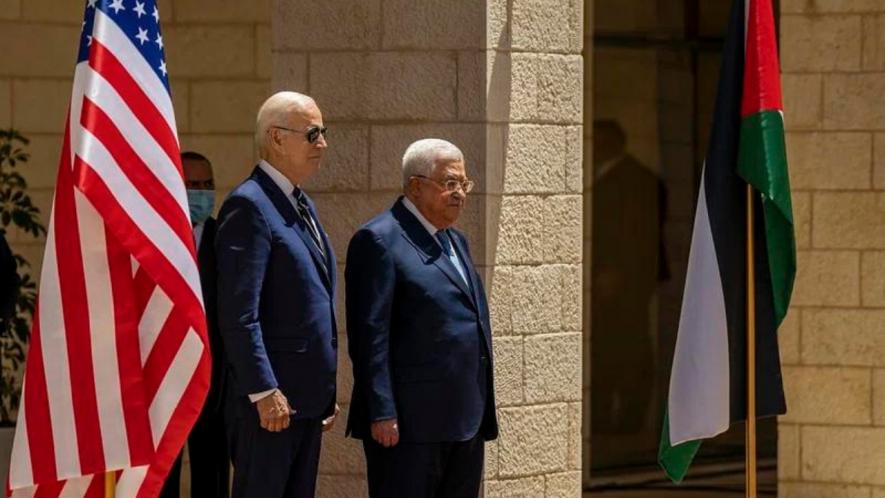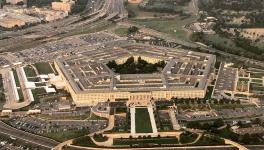Neocon Regime Change in Gaza Will complicate ‘Two-State Solution’

The Biden administration’s doublespeak scatters the strategic ambiguity that shrouded its stance so far. What stands out is a bizarre neocon project to force regime change in Gaza through coercion and install a pliant regime, midway to a “two-state solution”. (Joe Biden and Mahmoud Abbas. Image courtesy: Rawpixel)
The world-wide condemnation of Israel’s horrific violation of international humanitarian law is not deterring its military operations in Gaza. In remarks on Monday, Prime Minister Benjamin Netanyahu dismissed the calls for ceasefire, saying these “are calls for Israel to surrender to Hamas. That will not happen.” And he sought moral and spiritual support from the Bible for his war.
At least two armoured and infantry divisions of about 20,000 soldiers have reportedly entered the Palestinian enclave. The New York Times reported, quoting Christopher Maier, assistant secretary of defence, that US special forces, including commandos, have also been deployed to Israel. The report disclosed that several other Western nations have also quietly moved teams of special forces closer to Israel.
Maier said without elaborating, “We’re actively helping the Israelis to do a number of things.” As he put it, the situation in Gaza “is going to be a very complex fight going forward.”
On the other hand, there are growing domestic worries that the US could get entangled in another costly conflict in West Asia. Braving threats of physical assault and vilification by conservative media, 55 members of Congress have appealed to Biden and Blinken that Israel’s military operation should “take into account” international law. But the administration refuses to take much notice of such demands.
What emerges is a grim picture of President Biden giving a free hand to Netanyahu on how he chooses to seek retribution. In exceptionally sharp remarks, the Washington Democrat in the House Pramila Jayapal said on Sunday that the US is “losing credibility” on the global stage due to its “double standard” in its level of support for Palestinians compared to Ukraine, and as a result, the US is “being isolated in the rest of the world.” Jayapal flagged, “There are racists within the Netanyahu government.” This must be the first time that such pointed criticism of Israel is voiced by politicians in America.
Indeed, the Biden administration’s doublespeak scatters the strategic ambiguity that shrouded its stance so far. What stands out is a bizarre neocon project to force regime change in Gaza through coercion and install a pliant regime, midway to a “two-state solution”.
Mahmoud Abbas, a tragic figure but a fixture still of the Israeli-Palestinian conflict with a complicated multi-decade relationship with America and Israel (and his own people) appears to be at the centre of the proposed transition. At any rate, all roads lead to Ramallah.
The US Secretary of State Antony Blinken is heading for Israel on Friday on yet another regional tour. Significantly, during a testimony before the Senate Appropriations Committee on Tuesday, he publicly declared the Biden Administration’s project for the Palestinian Authority to return to the Gaza Strip from where it was ousted by Hamas in 2007, a year after the resistance group won the legislative elections.
As Blinken put it, “At some point, what would make the most sense would be for an effective and revitalised Palestinian Authority to have governance and ultimately security responsibility for Gaza.
“Whether you can get there in one step is a big question that we have to look at. And if you can’t, then there are other temporary arrangements that may involve a number of other countries in the region. It may involve international agencies that would help provide for both security and governance.”
It appears that Abbas at 87 may be a transitional figure. But the CIA and Mossad have longstanding contacts within Fatah.
Suffice to say, the regime change in Gaza Strip is at the core of the neocon vision of “two-state solution”, which Biden keeps talking about. Only, the US’ “two-state solution” and what the global majority understands it to be are two different things — like chalk and cheese.
Evidently, the US estimates that the unprecedented Arab unity is not going to translate as decisive action on the ground. Secondly, from Blinken’s words, the US intends to control and dominate the two-state solution (regime change in Gaza) per its blueprint.
To be sure, the Iran factor is going to be crucial. The US seems to be betting that so long as Israel does not invade Lebanon or go for the jugular veins of Hezbollah, Iran will not intervene. Now, that is a big gambit — the “known unknown” — as it underestimates Iran’s commitment to the Palestinian problem.
In Tehran’s assessment, Israel suffered a massive blow from Hamas from which it will not recover — that is to say, Israel is a weakened regional power going forward. Thus, an inflection point is reached, as the US’ capacity and influence is also diminishing.
Iran’s Foreign minister Hossein Amir-Abdollahian visited Doha and Ankara on Wednesday. While in Doha, he met with the head of the Hamas politburo, Ismail Haniyeh, for the second time last month. Later, while addressing a joint press conference with his Turkish counterpart Hakan Fidan in Ankara, Amir-Abdollahian warned that “If the genocide and war crimes against civilians are not stopped, the region is very close to making a big and decisive decision… (and) the consequences will be severe, and the warmongers will definitely not be able to bear the consequences.”
Meanwhile, the Russian position on the Gaza situation also has hardened. In a powerful speech at a meeting on Monday with members of the Security Council and Government and the heads of security agencies, President Vladimir Putin called out the US and its satellites as “the main beneficiaries of global instability … (who) are behind the tragedy of the Palestinians, the massacre in the Middle East in general, the conflict in Ukraine… channelling financial resources, including to Ukraine and the Middle East, and fuelling hatred in Ukraine and the Middle East.”
Notably, Putin compared the wars in Ukraine and Gaza as two sides of the same coin — manifestations of the US’ desperate attempt to shore up its diminishing global influence in a multipolar world. Putin alleged that Western intelligence instigated through social media the rioting in Makhachkala (Dagestan) on Sunday night in an attempt to provoke “pogroms in Russia”. Putin said the US and its satellites hatched the plot to discredit Russia.
Importantly, he drew the conclusion that “They (US) do not want Russia to participate in solving any international or regional problems, including in the Middle East.”
Where the Biden administration’s “two-state solution” is deeply flawed will be on four counts. First, the entire project is anchored on an absolute military victory over Hamas. It reminds one of the triumphalist cry of “Mission Accomplished” after the invasion of Iraq in 2003 and the deceptively easy ouster of the Taliban in Afghanistan previously. (By the way, Biden was an ardent supporter of the Iraq invasion and had voted to launch the war in Afghanistan in the first place, three days after the 9/11 attacks.)
Second, there is a human content here. Palestinians detest the US and Israel and will not submit to quislings handpicked by these countries. Both Fatah and Abbas are thoroughly discredited entities. At any rate, what makes the Biden Administration so very confident that the Arab regimes will be willing to act as Washington's surrogates or fifth column in Gaza? It is a rude and insulting assumption, to say the least.
Third, Hamas’ grassroots support cannot be wished away. Resistance movements may have their ups and downs but seldom die so long as conditions of foreign hegemony exist.
Finally, Washington would still need a UN Security Council mandate to legitimise whatever plot it is hatching, which is difficult to extract on American terms if Putin’s speech on Monday is anything to go by. Putin used exceptionally harsh language to describe the carnage unleashed in Gaza.
MK Bhadrakumar is a former diplomat. He was India’s ambassador to Uzbekistan and Turkey. The views are personal.
Courtesy: Indian Punchline
Get the latest reports & analysis with people's perspective on Protests, movements & deep analytical videos, discussions of the current affairs in your Telegram app. Subscribe to NewsClick's Telegram channel & get Real-Time updates on stories, as they get published on our website.























